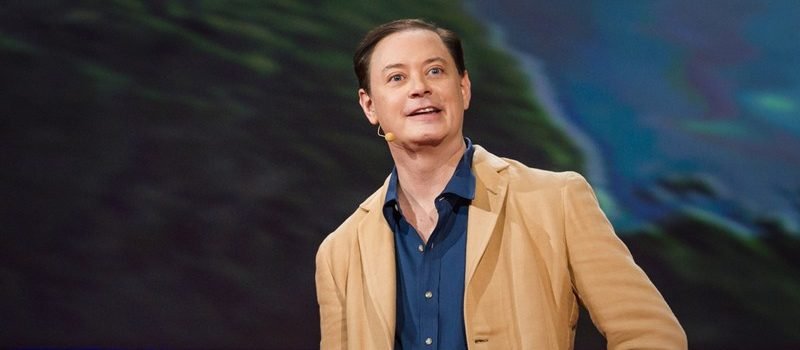Andrew Solomon: "Secret prisons: a vulnerability masquerading as a defense"
 There are few writers and advocates who have had such a profound impact on my work, both professionally and personally, as Andrew Solomon. I have drawn consistent inspiration from his ability to combine lyrical prose, a commitment to civil liberties and human rights advocacy, and a powerful, personal voice. And as I have spoken about often in my lectures, his articulation of the debilitating nature of depression has been life-changing for me and countless others.So it is particularly meaningful to me that Solomon chose to write about my TED talk for a special series called TED's "31 days of ideas."Please read and share his powerful call to action about secret prisons, below:
There are few writers and advocates who have had such a profound impact on my work, both professionally and personally, as Andrew Solomon. I have drawn consistent inspiration from his ability to combine lyrical prose, a commitment to civil liberties and human rights advocacy, and a powerful, personal voice. And as I have spoken about often in my lectures, his articulation of the debilitating nature of depression has been life-changing for me and countless others.So it is particularly meaningful to me that Solomon chose to write about my TED talk for a special series called TED's "31 days of ideas."Please read and share his powerful call to action about secret prisons, below:
There is little consensus in America about how to balance the four roles prisons play. Are they intended to warehouse people whose physical presence in our streets represents such a threat that they must be kept sequestered from the rest of us? Or are they to be as awful as possible so that the prospect of entering one becomes a deterrent to anyone contemplating a criminal act? Or are they there to gratify victims of crime by indulging their natural impulse toward vengeance? Or are they there to rehabilitate those who have committed crimes and help them to become upright citizens leading productive lives? Very little of the energy in the American justice system is devoted to the last of these four objectives -- and so long as that continues to be the case, our prison system will be expensive, cumbersome, overcrowded and ultimately ineffectual. Some people may be incapable of rehabilitation, but it's worth throwing resources at those whose behavior can be ameliorated -- not only because it's a humane way to treat prisoners but also because it reincorporates people into the social fabric, saving taxpayers the cost of further crimes, trials and incarcerations.Our government keeps up prison policies that are in many instances beneficial to no one except the contractors who run much of the prison complex. But, at least in general, the terms of imprisonment are fair within the logic of an unapologetic, broken system. Such fairness, however, disappears when the government locks people up for insufficient reasons and over the long term under unduly harsh conditions. Will Potter’s fiercely courageous TED Talk, "The secret US prisons you've never heard of before," plumbs the problem of secret American prisons for political prisoners. Potter is concerned with the mini-Guantanamos called "Communications Management Units" (CMUs). Part of what shocks in his talk is the simple fact that such facilities exist. Reminiscent of the Gulag, they are fundamentally incompatible with the values of a free democracy that, in principle, abhors torture and gives all men and women freedom of expression and a right to trial by jury. They invite the scorn of other democracies, and they destroy our high-minded position of superiority to dictatorships. They are a vulnerability masquerading as a defense, a system of brutality that does not strengthen our position in the world but weakens it instead.Potter describes how the units in Terre Haute, Indiana, and Marion, Illinois, work and what it’s like to be in one of these places for "second-tier terrorists." He places particular emphasis on the denial of prisoners' physical access to their visitors and talks about what it's like to be told that you can never hug your wife or child. CMUs have traded on their own horror; prisoners who have left don't talk about them because they know that doing so might send them back in.Part of what Potter chronicles is the larger problem of Islamophobia, which is poisoning our whole society. He recounts how one man was placed in the CMU because he sent medical supplies to Iraq, and he asserts that the government places non-Muslims in these units largely to avoid the appearance of conflict of interests, dwelling in particular on the case of Daniel McGowan. McGowan's multiple acts of arson on behalf of the Earth Liberation Front could reasonably be described as terrorism. Though I am not at ease with his methods, neither am I able to accept the treatment meted out to him and to others among the 400 terrorists Potter says are in American prisons. Potter reminds us of the long history of such units, which have operated under various rubrics for most of the last half-century. He set out to bear witness to what is being done to these prisoners and argues persuasively that it represents an abandonment of our most basic commitment to decency and human rights.We sing about being the "land of the free," but we increasingly circumscribe those freedoms or apply them selectively to an enfranchised minority. We feel entitled to engage in torture even though doing so violates our constitution and brings very little useful information. Our anxieties upstage our dignity. Will Potter's words are flatly delivered yet morally charged, his tenor at once radical and unafraid. His investigative journalism reminds us brilliantly of the human price we pay for cowardice and moral turpitude.

